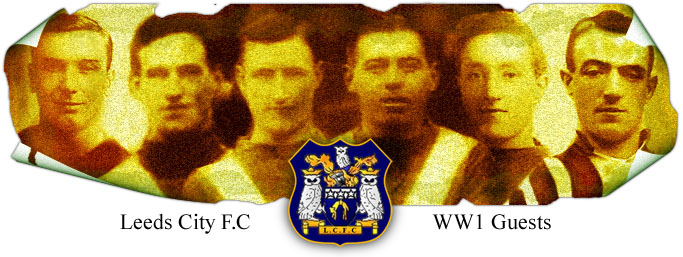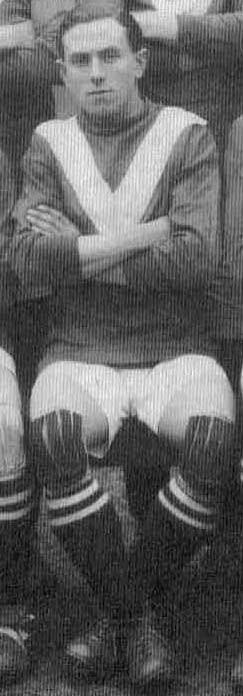

Moore: William Gray Bruce (Billy).
1916-1918 (Leeds City War-time Guest Player Details)
Inside Forward
Born: Newcastle-on-Tyne: 06-10-1894
Debut: v Huddersfield Town (a): 06-01-1917
Height & Weight: Unknown
William (Billy) Moore was born in Newcastle-on-Tyne on 6th October 1894. He played
amateur football for Seaton Delaval and was capped by England at Amateur level, before
joining Sunderland in 1913. Players in the Sunderland team at the time included Charlie
Buchan, George Holley, Charlie Gladwin, Joe Butler, James Richardson, Henry Martin, Jackie
Mordue, Frank Cuggy, Charlie Thomson, and Harry Low. His professional career was interrupted
by the First World War. It was during this time that he was a guest player for Leeds City,
scoring six goals in fourteen games. He became a regular in the Sunderland first-team after
the war and scored eleven goals in forty-six League games and one F.A. Cup tie for the club
over the next two seasons. Syd King, the Manager of West Ham United signed Moore in 1922.
Moore joined a team that included Jimmy Ruffell, George Kay, Edward ‘Ted’ Hufton, Jack
Treadern, Vic Watson, Sid Bishop, Billy Brown, Dick Richards, Jack Young, and Billy
Henderson. Jimmy Ruffell later said: "You couldn't wish for a better man alongside you than
Billy Moore. He was nippy and clever and was always surprising people. He didn't look tough,
but he was wiry. Sometimes a back would run at him and you'd think he couldn't come out of
that standing up but out he'd come and then make a perfect cross." Moore gain an F.A. Cup
losers’ medal as West Ham United enjoyed a good F.A. Cup run in the 1922-23 season beating
Hull City (3-2), Brighton & Hove Albion (1-0), Plymouth Argyle (2-0), Southampton (1-0) and
Derby County (5-2) to reach the final against Bolton Wanderers. The final took place at
Wembley Stadium, only four days after the stadium had been completed. The stadium had a
capacity of 125,000 and so the Football Association did not consider making it an all-ticket
match. After all, both teams only had an average attendance of around 20,000 for League
games. However, it was rare for a club from London to make the final of the F.A. Cup and
supporters of other clubs in the city saw it as a North v South game. It is estimated that
300,000 people attempted to get into the ground. Over a thousand people were injured getting
in and out of the stadium. When the game eventually got started, Joe Smith and David Jack
scored in Bolton's 2-0 victory over West Ham United. In their next game West Ham United beat
Sheffield Wednesday 2-0 to ensure promotion to the First Division, as runners-up. Vic Watson
was top scorer with twenty-two goals and Moore was second best with fifteen and was an
ever-present. He also scored five times in nine games in the F.A. Cup run. Later that month
he won his first International Cap for England against Sweden. Moore scored two goals in the
3-1 win. It was the only cap he won and therefore his goals-per-game is the best in
England's history. West Ham United finished in thirteenth place in their first season in the
First Division. Moore ended up as the club's top scorer with nine goals. The club continued
to struggle in the top division but Moore maintained his form and along with Vic Watson,
Jimmy Ruffell, Stanley Earle and Tommy Yews continued to score on a regular basis. Billy
Moore retired from football in 1929. In the First Division between 1923 and 1928 he scored
twenty-seven goals in one hundred and thirty-nine League games and once goal in twelve F.A.
Cup games from 1923 to 1928, when he retired. He had scored a total of forty-eight goals in
two hundred and two games in his time at Upton Park. After his retirement in 1929 he was
appointed assistant trainer until he was promoted to trainer-in-chief in 1932 and he
remained in that position until he retired in 1960. Moore lived in Plashet Road and was a
regular visitor to Upton Park after his retirement. He died in 1968.
| War-time Guest Appearances | Goals |
| |
| Principal Tournament 9 | 3 |
| Subsidiary Tournament 5 | 3 |
| |
| Total 14 | 6 |